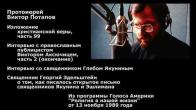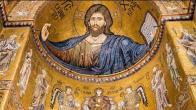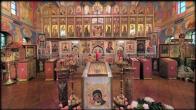You are here
Faith or Works of the Law? Galatians 2: 16-20. Priest Nikolai Kim
Knowing that a man is not justified by the works of the law, but by the faith of Jesus Christ, even we have believed in Jesus Christ, that we might be justified by the faith of Christ, and not by the works of the law: for by the works of the law shall no flesh be justified. But if, while we seek to be justified by Christ, we ourselves also are found sinners, is therefore Christ the minister of sin? God forbid. For if I build again the things which I destroyed, I make myself a transgressor. For I through the law am dead to the law, that I might live unto God. I am crucified with Christ: nevertheless I live; yet not I, but Christ liveth in me: and the life which I now live in the flesh I live by the faith of the Son of God, who loved me, and gave himself for me.
This passage is extremely important to the Christian worldview, and is difficult to understand. The Epistle to the Galatians is itself often called an epistle of freedom. In it stands in greatest relief the New Testament’s new [teaching] regarding the relationship between man and God.
To repeat, the principal concept in this passage is “justified by faith… and not by the works of the law.” Let us examine two principal terms: “faith” and “works of the law.” “Works of the law” may be understood either in the narrow, literal sense, or in a broader sense. Literally, it is the obeying of formal requirements of the ustav, the legal/liturgical requirements of the Law of Moses, the strict following of the Torah, of the Judaic law - and such an understanding of the meaning of the excerpt would be entirely correct. The Apostle Paul had as his immediate goal to proclaim that those who believed in Christ were freed from the prescriptions set down in the Old Testament.
However, we can understand the works of the Law in the broader sense of general demands of external, ritual piety, not only in the Jewish synagogue, but in the Christian Church as well. To take such an approach would be correct as well. In that instance, the message of the cited passage would be addressed directly to us: there are no religious rites or regulations that, divorced from faith, can guarantee us salvation.
Actually, the entire order of Christian life teaches that the main work of personal salvation rests not in external signs of piety, but in the inner recesses of our heart. However, here a great difficulty is presented. The passage is often cited by Protestants as a basic principle to justify their fundamental divergence from Orthodoxy. The matter has to do with the premises upon which soteriology (teachings on salvation) rests.
In brief, Protestant soteriology rests on the teaching that we are saved only by faith, that no works help in that work of salvation. Over the course of almost 2000 years, Orthodoxy has been saying something different. For our salvation, it is not only faith that is necessary, but also personal effort, i.e. “good works.” The importance of this problem, this divergence, is obvious even on cursory examination. After all, if is not only Protestant theology, but mankind’s general, most prevalent religious self-determination today looks something like this: I believe, but God is in my soul. Why should I go to church, repent, and fast? I can pray internally and God will hear me. This would appear to be entirely consonant with the words of Apostle Paul just cited. However, it only appears to be so. Let us consider more attentively what such faith is, and whether it can even be called faith, or merely a declaration of faith. Here is the typical Protestant assertion: I believe, and therefore, I am already saved! Here, it becomes obvious that faith itself has been replaced with the manifestation “I believe.” I.e. we are dealing not with faith, but with words about faith.
Is faith but a matter of words alone? Faith, like hope and love, is a person’s internal state; it is essential that it be manifested in his behavior and works. The Lord Himself asks, “How can you say that you love God, but hate your brother?” How can we say that we have hope in the general resurrection, the mercy of God and eternal life, while we ourselves go around despondent and exhausted by temporary sorrows and misfortunes experienced in our vanity-filled lives? How will we be able to say, “I believe, O Lord, but for our salvation we do not need your providential activity, do not need repentance, do not need the Commandments. I believe in Thee, but just don’t approach me, don’t enter into me in the Eucharistic Mystery!” It was precisely this delusion that the Apostle James had in mind when he wrote his Epistle, whose meaning can be briefly summarized in the powerful phrase “faith without works is dead.” Thus, if faith is alive in us, it must be manifested in our lives; the soul’s striving toward God must be an actual striving, an activity and not just a declaration.
Our analyses lead to a conclusion: From today's reading, we should clarify for ourselves at least two important conditions: First of all, without personal faith of the heart, no formal rituals will, in and of themselves, open to us the path to the Kingdom. Second, faith that is not manifested in life, faith without actual union with Christ in the Holy Mysteries, without following Him according to His Commandments, is not faith, but empty words about faith. Thus, works without faith are nothing, and faith without works is dead. These are the two poles of human delusion; between them lies the Royal Path of Christian freedom.
Priest Nikolai Kim
Relics in cathedral - monthly calendar
| S | M | T | W | T | F | S |
|---|---|---|---|---|---|---|
|
|
|
|
1
|
2
|
3
|
4
|
|
5
|
6
|
7
|
8
|
9
|
10
|
11
|
|
12
|
13
|
14
|
15
|
16
|
17
|
18
|
|
19
|
20
|
21
|
22
|
23
|
24
|
25
|
|
26
|
27
|
28
|
29
|
30
|
31
|
|
PARISH LIFE
Address of our Cathedral
While all the materials on this site are copyrighted, you may use them freely as long as you treat them
with respect and provide attribution on the Russian Orthodox Cathedral of St.John the Baptist of Washington DC.









